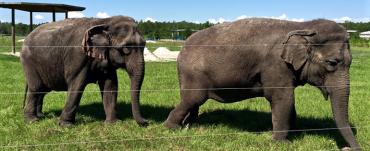
The Ringling Brothers and Barnum & Bailey Circus' 11 remaining Asian elephants, after final May 1 performances in Wilkes-Barre, Pa., and Providence, R.I., arrived last Thursday at Ringling's Center for Elephant Conservation in Polk City. The elephants joined Ringling's herd of 29 to live out their days.
These creatures have spent the last two-and-a-half years traveling 36,000 miles on a 64-car train, performing 900 times in more than 80 cities for the world-renowned "Greatest Show on Earth." Elephants just like them had done the same thing for 145 years.
The endangered elephants, closest living relatives to the mastodon, will be studied, according to the Center's website. There are just 35,000 worldwide, 280 of them in North America and now 40 at the Central Florida Center for Elephant Conservation. The company says it will breed them to preserve the species. Because they are endangered, they can be neither imported nor exported. Some will be donated or loaned to zoos, but not sold.
Decades of litigation, protest and mounting scrutiny from swaths of animal rights activists, as well as a shifting public opinion toward the captivity and use of wild animals for entertainment, forced the circus to phase out its long-running elephant act for good. Feld Entertainment Inc., the circus’ parent company, announced the decision in March 2015, initially planning to retire its remaining touring elephants by 2018. But nearly a year later, the company said its elephants would perform for the final time in May, at least 18 months earlier than expected.
Officially, the company's parent Feld Entertainment said it wasn't the protesters from People from the Ethical Treatment of Animals who ended the program two years earlier than its planned demise, but the town-by-town patchwork of restrictions on how the company handles them that made it impractical.
"You can't leave the elephants at the border," Feld spokesman Stephen Payne told reporters for Indonesia News. "If City A had different regulations than City B, that posed a problem. So rather than continue to fight all these regulations, we decided to make an even greater investment here at the Center for Elephant Conservation to really put our money, our time, all our efforts to make sure this species is going to be around for future generations."
Read here the long battle to remove elephants from the Ringling Brothers' shows.
Pediatric cancer specialist Dr. Joshua Schiffman of Utah's Huntsman Cancer Institute will study the elephants' blood for clues into how humans can improve their cancer resistance as elephants do. Elephants are made up of about 100 times the number of cells humans are, which means they should be 100 times more likely to develop cancer. But they rarely do. It's theorized this is because humans have two cancer-fighting P-53 genes, while elephants have 40.
"We know that the elephants themselves rarely develop cancer and we believe this is due to the extra copies of this P-53 gene that they have in all of the cells in their body," Schiffman told me. "By studying their blood closely and understanding how this P-53 gene works, what we're trying to understand is: Can we one day synthesize, make our own elephant P-53 in the laboratory, load it up in some type of novel delivery system to use as a drug to treat cancer or maybe - just maybe one day in the future - prevent cancer, the way that these elephants almost never develop cancer themselves."


